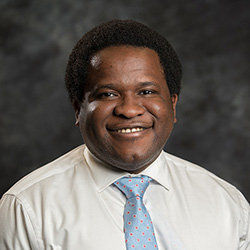
Professor Etudo Created Software that May Pinpoint ISIS, Other Hate-Groups’ Radicalization Sites
A fascinating trait of mass murderers and terrorists is that they typically leave a lengthy manifesto detailing the impetus for their actions.
Those diatribes are like gold to UConn OPIM professor Ugochukwu “Ugo” Etudo. He has used them to create software that can search mainstream web sites, as well as the dark web, to help identify websites which espouse radical, terroristic ideologies that encourage people to cause harm.

“I’m interested in the ideologies that could drive people to commit such terrible acts,” Etudo said. He believes that scrutinizing potential terrorists is only half of the equation. Governments also need to attack the propaganda that persuades potential terrorists to act.
“The ever-increasing use of the internet by terrorist groups as a platform for the dissemination of radical, violent ideologies is well documented,” he said. “The internet has, in this way, become a breeding ground for potential lone-wolf terrorists: that is, individuals who commit acts of terror inspired by the ideological rhetoric emitted by terrorist organizations.
“These individuals are characterized by their lack of formal affiliation with terror organizations, making them difficult to intercept with traditional intelligence techniques,” said Etudo, who joined the UConn faculty this semester.
Terror Organizations More Similar Than Different
In 2011, a far-right terrorist named Anders Breivik committed two atrocious acts in Norway—a bombing, followed by a shooting, that combined left 77 people dead. Authorities discovered a 1,000-page document highlighting his many gripes, ranging from opposition to Islam to blaming feminism for European “cultural suicide.” The document is public record and Etudo has studied it extensively.
“Almost all lone wolves leave a memoir. They like to broadcast their intent—and that’s what makes this project feasible,” Etudo said.
But he didn’t stop there. He collected materials from Al Qaeda; the Animal Liberation Front; the Ku Klux Klan and the Popular Front for the Liberation of Palestine. More recently he examined ISIS propaganda, including its glossy magazines.
“When we started investigating ideology and how to collect it, we looked at propaganda and found commonality across many causes,” he said. Often terror proponents are diagnosing a problem or injustice that’s close to home, linking the issue with a perceived enemy, and warning that although members of that group may seem like friends, they are not. Then they try to motivate followers by outlining a course of action.
“They almost all have a mantra that says, ‘Be on our side. We are winning!,'” Etudo said. “The pattern exists over and over again.”
“One example might be an extremist animal cruelty organization that bombards followers with statements like, ‘How can you possibly sleep at night? Every time you look at your pet, you know someone is harming another animal!'” Etudo said.
The ‘Wild, Wild West’ of Data Analytics
After identifying these patterns, in conjunction with his Virginia Commonweath University Ph.D. adviser Victoria Yoon, Etudo set out to create a software program that could comb through these documents quickly.
He was able to cull examples and distinguish word sequences, negative tones and implications of a worsening situation, and train the software to identify these warning signs. It can review the content of a document in minutes, a task that would take a person many days.
His software can autonomously “crawl” from site-to-site, enabling it to explore domains that don’t have a formal web address, therefore investigating related propaganda on the dark web. Etudo said the program is accurate 87 percent of the time.
“A goal of this system is to make sense of radical, terroristic propaganda at scale. It can ‘consume’ massive amounts of information requiring far too much human effort,” Etudo said. “I love this work. It keeps me on the edge, it keeps me sharp. Most analytics work involves numbers, but this is unique because it analyzes text.”
“I’m hoping for funding to keep working on it,” Etudo said. Currently his software can only analyze text that is in English. He would like to make it multilingual and improve its accuracy rate.
“Using these tools should be as simple as using a colander,” he said. “This should be a filtering tool that detects those that may be espousing radical ideology. I feel very strongly, though, that it doesn’t mean that the police should be knocking on the door of anyone who espouses negative or unusual beliefs. I think it is a filter that can allow human experts to investigate the sites that are generating the most concern.”
This project has been three years in the works and at times Etudo has wondered if he was pursuing the impossible.
“So many times I’ve thought, ‘Man, what are you doing?’ but I’ve just tried to keep the faith,” said the Nigerian native. “I remember the day I knew it was going to work. It was two months before my dissertation defense date. I was having trouble getting the software to work. I called my sister and said, ‘I’m freaking out.'”
“She bought me a plane ticket to Puerto Rico for a week. I was in my hotel room, staring at the ocean, waiting on the first table of results, and when I saw it, it looked good. I said, ‘Yes!’ It was a magical time!”
For his research efforts, Etudo earned the Virginia Commonwealth University Presidential Research Quest Fund Grant this summer, a $50,000 grant to support continued research on automated systems for identifying terroristic content on the web.
“Access to this information, in the data analytics world, is kind of similar to the wild, wild west,” he said.
The recent spate of mass murders in our nation drive home the urgency of these efforts, Etudo said.
“Recent events underscore the need for us to gather as much intelligence as we can on the make-up of these radical ideologies,” he said. “Such intelligence is particularly useful for identifying emerging targets and rationale of terroristic violence.”